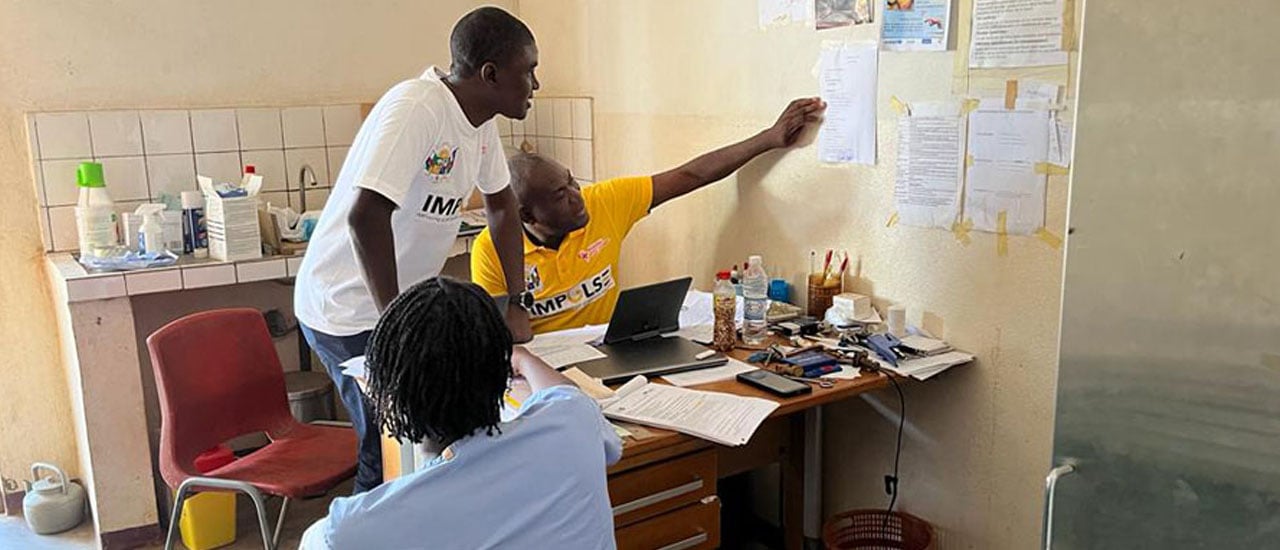
IMPULSE team in CAR
Improving quality and use of newborn indicators (IMPULSE study)
The IMProving qUaLity and uSE of newborn indicators (IMPULSE) study aims to improve newborn routine data quality and use in high mortality settings for Every Newborn to survive and thrive.
The IMProving qUaLity and uSE of newborn indicators (IMPULSE) study is a two-phase project aiming to describe and improve the quality and use of facility-level newborn indicators in four African countries: Central African Republic, Ethiopia, United Republic of Tanzania and Uganda.
IMPULSE phase 1
Measuring newborn data quality and use in 90-120 health facilities and linked district data offices with the EN-MINI Tools
IMPULSE phase 2
Co-creating an intervention to improve newborn data quality
Recent updates
Events
Newsletter
Contact us
Twitter: @MARCH_LSHTM
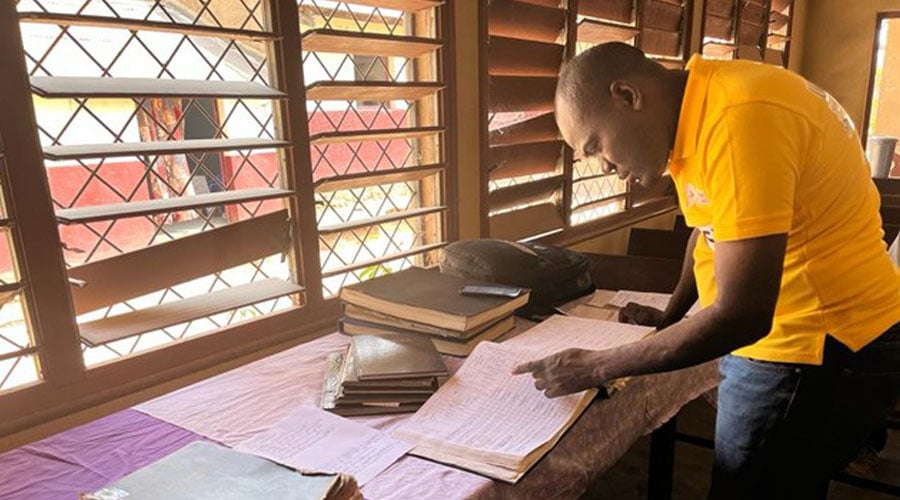
Project rationale
Few years remains to meet the SDG 3.2 target for every country to reach a newborn mortality rate (NMR) of 12 deaths or fewer per 1000 births. While many low and middle-income countries have made impressive progress towards the target, many African countries still face constrains to be on track for 2030.
The right high-quality data at the right time and at the right level of the health system are urgently needed to accelerate progress for Every Newborn and especially for those who are small and sick. Gaps in high-priority data quality and use must be closed to end preventable deaths (survive); ensure health and well-being (thrive) and change how small and sick newborns are cared for (transform). The IMPULSE study has been designed to generate evidence to close these critical data gaps.
Activities
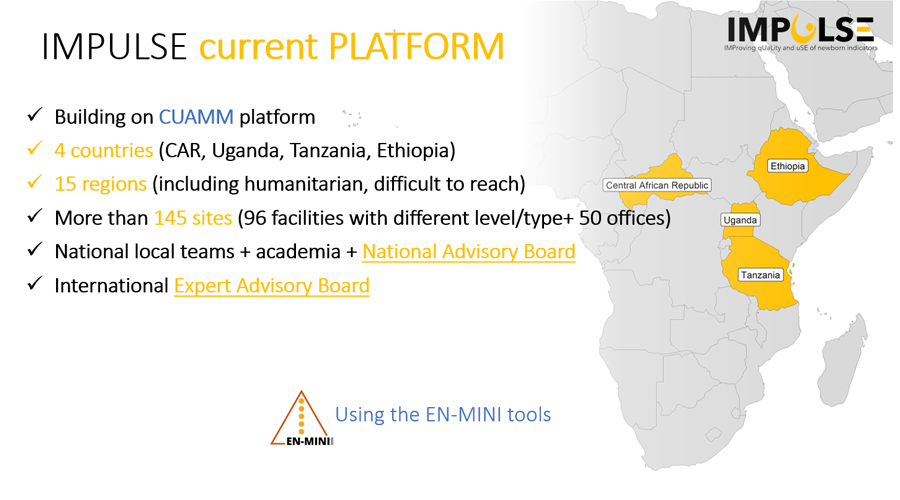
The project includes 2 phases:
- Phase 1 aims at performing a comprehensive assessment on newborn data quality and use in 15 regions in 4 African countries (146 sites)
- Phase 2 aims at Co-creating and testing, together with national and international stakeholders, practical sustainable intervention(s)/tools to improve routine newborn data availability, quality and use.
Expected outputs
- A detailed comprehensive assessment of newborn data quality and use, according to the PRISM framework, across different regions, and at different levels of the health system
- New tools for data quality assessment (Neonatal Inpatient Individual Data Assessment Tool case Notes/ Register: [coming soon])
- An analysis of the impact of the COVID-19 pandemic on newborn data quality
- A collection of Users’ recommendations for improvement
- New sustainable intervention(s) /tools to improve routine newborn data availability, quality and use.
- Capacity exchange and co-learning across 6 countries
The IMPULSE Study team
- Principal Investigator - Prof Marzia Lazzerini (London School of Hygiene and Tropical Medicine)
- Co-Principal Investigator - Louise Tina Day (London School of Hygiene and Tropical Medicine)
Partnership
IMPULSE is a collaborative project among different institutions – the London School of Hygiene and Tropical Medicine (LSHTM) in UK, the World Health Organisation (WHO) Collaborating center for Maternal and Child Health Italy, CUAMM Doctors with Africa, the Ifakara Health Institute in Tanzania, and Makerere University in Uganda- and aims at addressing some of these gaps with a specific focus currently in four African countries.
The project is funded by the Chiesi Foundation.
Recent updates
Events
Newsletter
Contact us
Twitter: @MARCH_LSHTM
Meet the team of IMPULSE Study Researchers:
LSHTM
CUAMM
Country coordinators
- Tanzania: Jacqueline Minja
- Tanzania: Donat Shamba
- Uganda: Muhumuza Kananura Rornald
- CAR: Ousman Mouhamadou
- Ethiopia: Firehiwot Abathun
- Ethiopia: Mary Ayele
WHO Collaborating Center MNCH Italy
Advisors
IMPULSE is supported by:
- National Advisory Group in each country and
- International Advisory Group
International Advisory Group
- Theresa Diaz, WHO Geneva
- Martin Dohlsten, WHO Geneva
- Danielle Ehret, Vermont-Oxford Network
- Tedbabe Degefie Hailegebriel, UNICEF New York
- Debra Jackson, LSHTM
- Ornella Lincetto , Independent
- Allisyn Moran, WHO Geneva
- Assumpta W. Muriithi, WHO AFRO
- Moise Muzigaba, WHO Geneva
- Barbara Rawlins, USAID Washington
- Jennifer Requeio, Johns Hopkins University
- Johan Ivar Saebo, University of Oslo / DHIS2
- Kavita Singh, University of North Carolina
- Alex Stevenson, African Neonatal Association
- Merran Thomson, Technical Advisor Chiesi Foundation
- Karen Walker, Council of International Neonatal Nurses (COINN)
- Wilson Were, WHO Geneva
- Teshome Desta Woldhanna, WHO
Recent updates
Events
Newsletter
Contact us
Twitter: @MARCH_LSHTM

IMPULSE phase 1
IMPULSE Phase 1 is operating in four African countries (Central African Republic, Ethiopia, Tanzania and Uganda), with a special focus on small or sick newborns, with the following objectives:
- Map newborn indicator data availability in existing routine health information systems (RHIS).
- Assess newborn key indicator data quality in existing RHIS
- Understand newborn indicator data use by different stakeholders in existing RHIS
- Analyse technical, organizational and behavioural enabling factors in RHIS to improve newborn indicator data quality and use
- Measure the effect of the COVID-19 pandemic on newborn RHIS data
IMPULSE phase 1 is using the EN-MINI Tools.
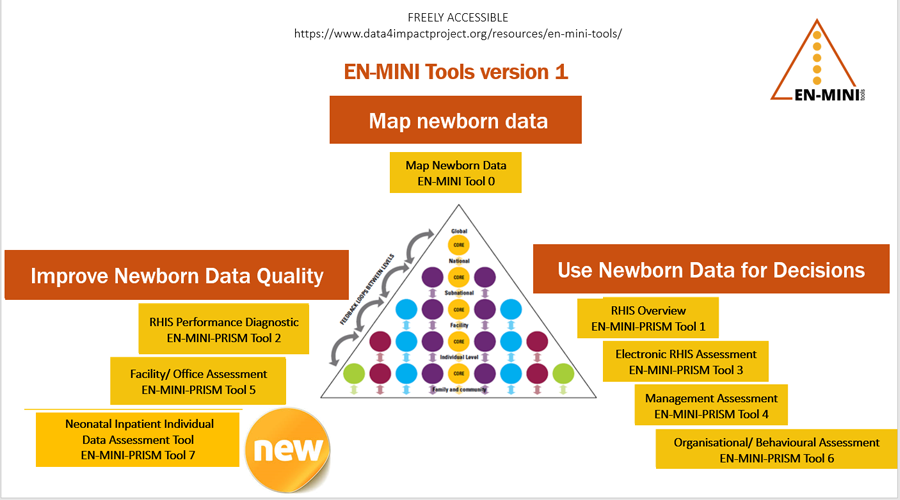
The IMPULSE team have contributed to EN-MINI Tools version 2.0 and are co-creating additional innovative tools including individual newborn clinical case notes assessment tools and implementation support tools.
Data collected will cover all domains of the PRISM framework.
IMPULSE phase 2
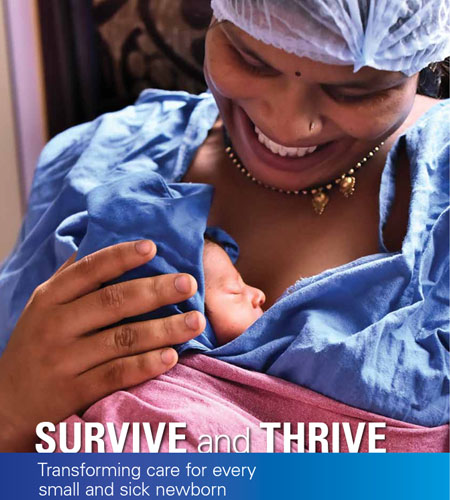
IMPULSE Phase 2 will be co-designed using a theory of change based on
evidence generated in phase 1. The research protocol will be designed during 2023/2024. Phase 2 will focus on:
- Co-creating, together with national and international stakeholders, practical sustainable intervention(s) /tools to improve routine newborn data availability, quality and use of data for action to improve newborn health and wellbeing, in health facilities caring for small and sick newborns in high mortality settings.
- Testing feasibility, effectiveness, resources needed and cost of the co-created interventions/tools.
The ultimate aim of IMPULSE Phase 2 is contributing in improving newborn data quality and use. As recommended by WHO “Gaps in high-priority data must be closed to end preventable deaths (survive); ensure health and well-being (thrive); and change how small and sick newborns are cared for (transform). To accelerate progress towards targets for the Survive, Thrive and Transform agenda, ambitious change is needed, especially to measure coverage and quality of hospital-based interventions". (WHO 2019)
Recent updates
Events
Newsletter
Contact us
Twitter: @MARCH_LSHTM
EN-MINI Tools can be found here: EN-MINI Tools
- Neonatal Inpatient Individual Data Assessment Tool case Notes/ Register
- IMPULSE Study concept note (pdf)
- IMPULSE Study presentation at #IMNHC2023 Conference Cape Town May 2023
- IMPULSE factsheet (pdf)
- IMPULSE results - Central Africa Republic (French) (pdf)
- IMPULSE results - Ethiopia (pdf)
- IMPULSE results - Tanzania (pdf)
- IMPULSE results - Uganda (pdf)
Recent updates
Events
Newsletter
Contact us
Twitter: @MARCH_LSHTM
- Systematic review: Lundin R, Mariani I, Peven K, Day LT, Lazzerini M. Quality of routine health facility data used for newborn indicators in low- and middle-income countries: A systematic review. Journal of Global Health 2022; 12. https://www.ncbi.nlm.nih.gov/pmc/articles/PMC9031513/
- IMPULSE Phase 1: IMPULSE phase 1 results are expected by end of 2023 and 2024
- IMPULSE PHASE 2: MPULSE phase 2 results are expected by 2026
Recent updates
Events
Newsletter
Contact us
Twitter: @MARCH_LSHTM
International Maternal Newborn Health Conference, Cape Town May 8-11, 2023
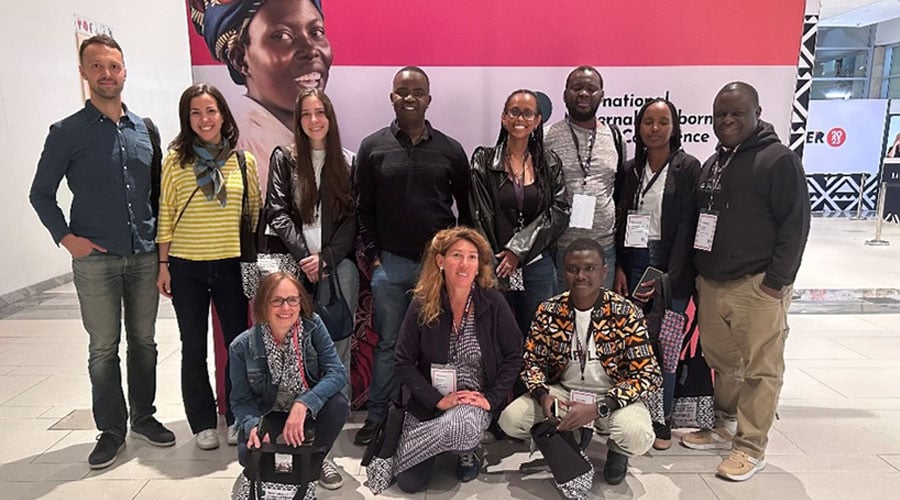
In May in Cape Town, South Africa, about 1800 stakeholders from around the world came together to accelerate solutions to improve maternal and newborn survival and prevent stillbirths in a coordinated and inclusive manner.
Read more about the event.
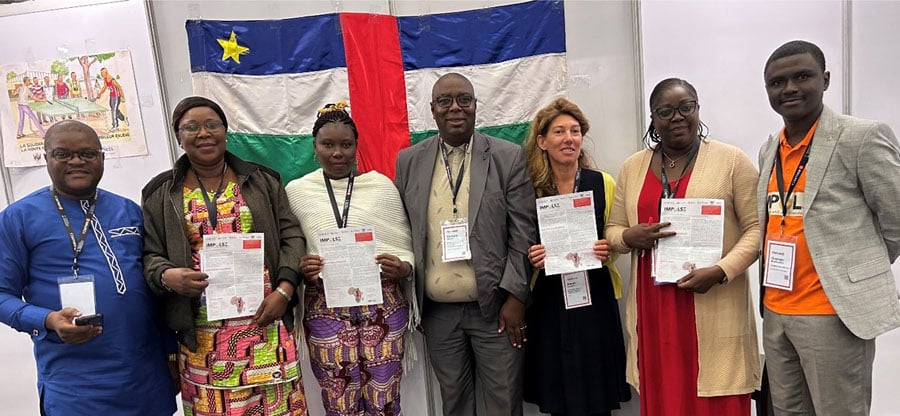
Above are the Members of the Central African Republic (CAR) delegation. From the left:
- Westone Tarsile-Miller LEMBE, Prêtre et Représentant des ONG Nationales (CAR).
- Mme Fali Flore Florence, Directrice Générale de la Jeunesse (RCA).
- Carine KITEZE, Responsable du Service de Néonatalogie au CHUPB (Bangui, CAR).
- Richard NGBALE, Gynécologue - Obstétricien au CHU Communautaire (Bangui, CAR)
- Marzia Lazzerini (IMPULSE Principal Investigator LSHTM)
- Adam Claudia, Directrice de la Santé Familiale au MSP (Bangui, CAR)
- Ousman Mouhamadou (IMPULSE Study Coordinator CAR)
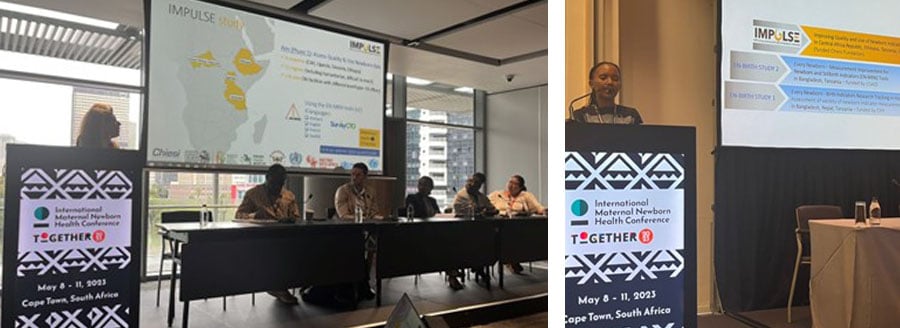
Phase 1 events
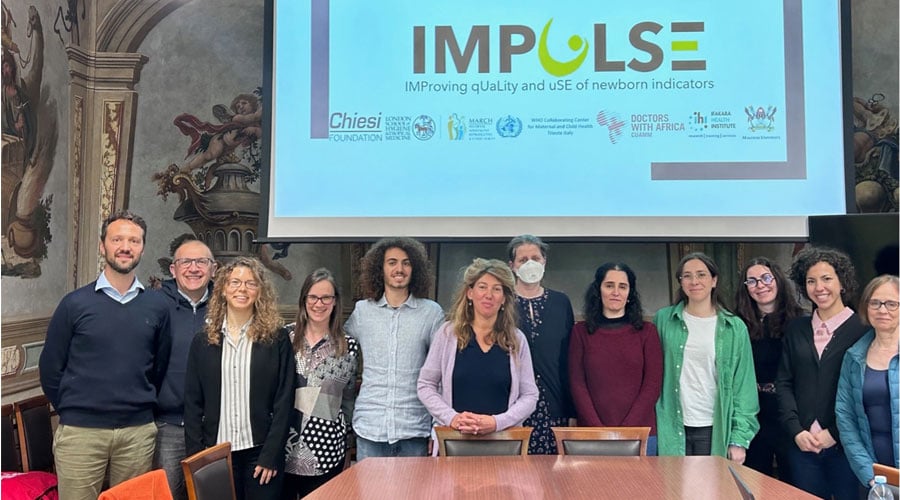
The IMPULSE team met on 19-20 April 2023 in Papua Italy to discuss results of the interim analyses conducted and further plan for Phase 2.
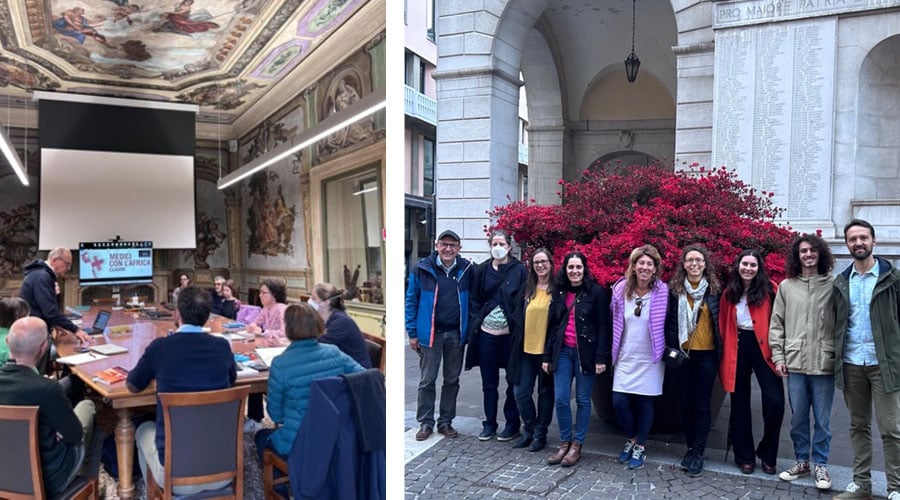
List of attendees:
LSHTM
- Marzia Lazzerini, IMPULSE PI
- Louise Tina Day, IMPULSE Co-PI
- Claudia da Silva IMPULSE Administration
CUAMM
- Andrea Borgato CUAMM Deputy Director
- Giovanni Putoto CUAMM Programs & Research head
- Francesca Tognon CUAMM Programs & Research
- Mara Forbicioni CUAMM Administration
- Andrea Iannetti CUAMM Administration
- Fabio Manenti CUAMM Country Representatives Tanzania
- Gaetano Azzimonti Country Representatives Ethiopia
Country coordinators (online)
- Jacqueline Minja Country coordinator Tanzania
- Muhumuza Kananura Rornald Country coordinator Uganda
- Ousman Mouhamadou Country coordinator CAR
- Firehiwot Abathun Country coordinator Ethiopia
- Mary Ayele Country coordinator Ethiopia
WHO Collaborating Center MNCH Italy
- Marzia Lazzerini, PI
- Ilaria Mariani, biostatistician
- Sara Geremia, biostatistician
- Paolo Dalena, biostatistician
Chiesi Foundation
- Massimo Salvadori, coordinator CHIESI Foundation
- Michela Papotti CHIESI Fundation
- Federica Cassera CHIESI Fundation
- Merran Thomson, technical advisor CHIESI Foundation
Recent updates
Events
Newsletter
Contact us
Twitter: @MARCH_LSHTM




